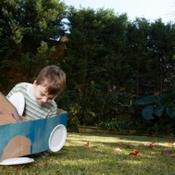Is It Selfish to Bring a Child into an Unstable World?
Dear GoodTherapy.org,
I grew up in a large, loving family, and thought for most of my life that I’d have a few kids of my own. I do ache for a family all my own, children to shape, share, and dream with, and the life that comes with being a part of something bigger than myself.
But in an increasingly hostile and unstable world, I have found myself in recent years questioning whether bringing another soul into it is a selfish or irresponsible act. I am not generally a pessimistic person, but trends over the past couple of decades—violence, overpopulation, pollution, disease proliferation, climate change, and more—give me little reason to believe the world will be a hospitable or positive environment for any children I choose to have (by the time they become adults, anyway). I don’t think I’m being overly fearful. These concerns are real, and they’re not going away. If anything, they’re very likely to worsen.
So where does that leave me? These concerns aren’t stopping most people from having children. All my friends are having them, blissfully leading their new, bigger lives seemingly without any consideration for what their children will face 10, 20, 50 years from now. I wouldn’t ever call these parents selfish or irresponsible to their faces, but I do think they are, at least to some degree. If I have children of my own, I think I’ll feel like a hypocrite. If I don’t have children, I may feel like I have the moral high ground but my life will be emptier, too. I don’t know how to reconcile these feelings.
Am I looking at this all wrong? Please help! —Conflicted About Children
Submit Your Own Question to a Therapist
Dear Conflicted,
The tension you are describing, between general principles and specific emotions, is challenging to reconcile. You are essentially torn between your head and your heart. Yes, the world can feel like a dark and scary place, particularly when so much of the news we read and hear focuses on tragedy. And yes, overpopulation is a global concern. Your concerns are real, and thinking about the world that your potential child(ren) might inherit is not unreasonable.
I wonder, however, about the role hope has for you as you look to the future. Is it possible that our children and our children’s children might play a pivotal role in reshaping the world for the better? In many ways, hope in the face of bleak prospects is one of the most radical stances we can take, and there is little in this world more hopeful than bringing a new life into this world. The parents you see “blissfully living their lives” are likely incredibly concerned, like you are, about the world their children will inherit. Perhaps that makes them more likely to live intentionally and seek solutions to the issues we face globally.
If adding to the global population truly does not sit well with you, there are ways to parent and nurture children who are already in the world and who could benefit from having loving adults to share and dream with.
None of us knows what will come next—what changes the world will see, what surprises our futures have in store for us. If we live only with thoughts about the long-term future, we risk missing the joy that can be found in the present moment. Your expressed desire to experience “the life that comes with being a part of something bigger than myself” is powerful and reveals something about how you find meaning in the world. There are, however, many ways to experience that life. If adding to the global population truly does not sit well with you, there are ways to parent and nurture children who are already in the world and who could benefit from having loving adults to share and dream with.
As you try to reconcile your mixed feelings, it might be helpful to find a good sounding board to explore how you might live authentically without denying yourself opportunities to live meaningfully. Counseling can be a great resource.
One final thought: I hear your concern about feeling like a hypocrite if you make choices at odds with your stated principles. True wisdom lies in reshaping our beliefs as we learn more about ourselves through life experience. This isn’t hypocrisy, it is growth. As you explore your feelings, it will be important to be open to reexamining what you believe and to be compassionate with yourself as you change and continue developing your worldview.
Best of luck,
Erika
- 7 comments
- Leave a Comment
Gladys
August 19th, 2016 at 1:44 PMI don’t think that it is selfish at all. We all have a desire to share our lives with people surrounding us that we love. We never love anyone more than we do our own children, I say that as a mother, wife and a grandmother. There is something very special about raising children to be good and honorable people, and hopefully these children that we are raising today can make a significant difference for the better for this world tomorrow.
marco
August 22nd, 2016 at 9:24 AMSo glad you wrote, sort of feeling that same way, like is it selfish not to me necessarily but to bring a child into a world that I know will be filled with uncertainty for him or her?
Tanner
August 22nd, 2016 at 3:31 PMI believe that every generation has probably felt this way at one time or another.
Leave a Comment
By commenting you acknowledge acceptance of GoodTherapy.org's Terms and Conditions of Use.



 What If Babies and Toddlers Understand More Than We Think?
What If Babies and Toddlers Understand More Than We Think?  Learning Through Play: The World as Your Child's Classroom
Learning Through Play: The World as Your Child's Classroom  Want to Help Your Kids? You Can Start by Not Helping Them
Want to Help Your Kids? You Can Start by Not Helping Them 
